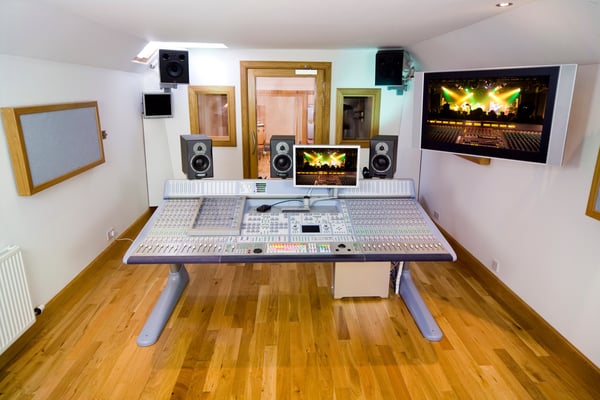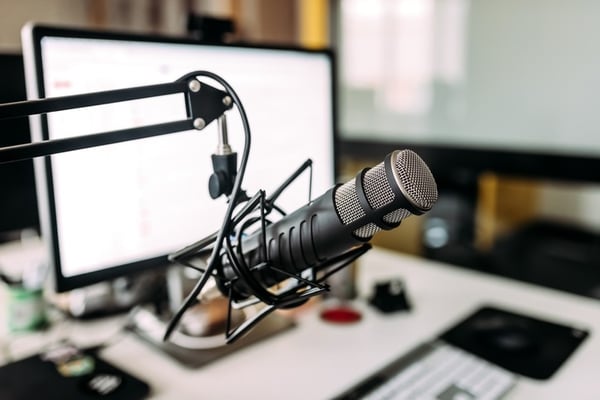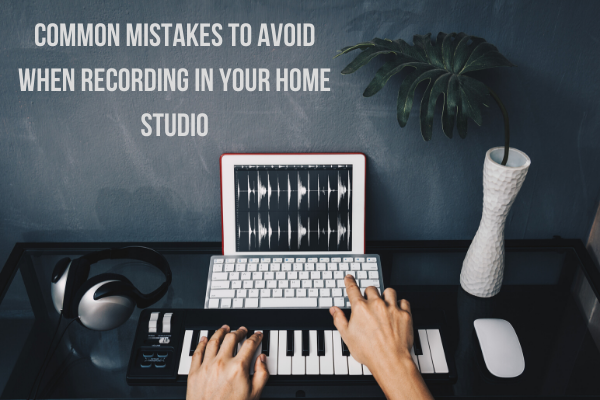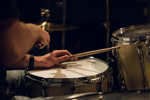5 Mistakes to Avoid When Recording In-Home
It is becoming more common these days for producers and songwriters to set themselves up with their own in-home recording studios.
At first, songwriters did it to forgo the process of booking and paying for studio time that they need to get everything done within the allotted time. As for producers, paying for a rental space to house your equipment can become rather pricey.
Now, due to the recent outbreak of COVID-19, having a home studio set-up has become critical for musicians and producers who want to continue staying active.
Just because you have the gear does not mean that you are equivalent to a professional recording studio, however.
Understanding the mistakes that are made all too often by songwriters who take the in-home recording route, is the first step in a successful home recording session.
In the article below, we will go over a few technical and practical mistakes to avoid while recording in your home studio.
Table of Contents
1. Phones, Doors, and Windows

Creating as much isolation as possible in a space that probably wasn't built to keep noise out is a major task. If you're lucky enough to record in a custom-built studio, this will be less of an issue.
However, if you're recording in a modified bedroom or spare room as a lot of people are, it's more of an issue. Choosing the best room based on aesthetics (natural lighting, wall color, lights) may not bode the best results for your production project.
If you have no choice and it is the only space available, then take the necessary precautions. Before recording, you should shut all of your windows and doors to stop external sound from getting in.
You should also do it so you the sound from your guitars, drums, or monitors being blasted out and irritating your neighbors. And, whenever you're recording using microphones, you should be sure to turn all of your mobile and landline phones off.
If you're in a home studio, you want to avoid being in the mindset that you are at home rather than at work.
Treating your recording space as work will help you take the steps you would usually take if you were paying for studio time. Click here soundproofing tips.
2. Over-using Effects
A common mistake that musicians may make when attempting in-home recording is relying too heavily on effects.
It's easy to lean on effects, both pre-amp, and post-recording, to make up for the lack of clarity, warmth, and overall quality of a home studio recording.
Reverb is the most commonly over-used effect, which is frequently used to make recordings sound less flat or more professional.
Pinpointing the proper amount of reverb to use to remove the flatness of a vocal recording is difficult even for experienced musicians.
Unfortunately, many artists make the mistake of drowning their recordings with reverb that the notes eventually become slurred together and completely indistinguishable.
A good rule of thumb is to always try to record as clean as possible. Avoid pre-amp effects whenever possible, and only use effects to do minor touch-ups or additions afterward. Check out our best tips on preparing a song for mastering.
3. Getting Distracted
This is another common problem but one that's easily solved if you have a decent amount of willpower.
Again, if you're not explicitly paying for booked studio time, you tend to place less pressure on yourself to act as if you are working. That can be a good thing because it means less stress.
But it can also lead to a loss of focus.
Checking your social media, reading news updates, and watching TV are all nice distractions, but they don't get you closer to the goal of finishing your tracks.
There's barely a moment of the day when we don't have access to all of these things. Everyone has their own level of tolerance to technology bans.
No matter how much willpower you have, it's worth turning off the iPad and your computer's Wi-Fi to remove the temptations. Don't trust your willpower? Simply remove as many distractions from your studio as possible.
4. Cheap Cables
One of the first things to learn when you try to record at home is that your recording equipment is only as good as the cables you have connecting it all together.
This goes for all aspects of your recording.
From the cables you use for your instruments and microphones to the cables used to connect your recording equipment to your computer, they all will affect the quality of your recording.
Each cable used is carrying the signal of your recording. Cheap cables in the mix can add unwanted distortion.
You don't need to go out and buy solid gold cables, but just be wary about the cables you purchase.
Try to avoid the hugely discounted cables at all costs. Check out this guide to learn more about home studio cables.

5. Working Too Long
As we've mentioned before, working in a home studio can lead to a loss of focus.
However, the opposite is also true.
Some people find that because there's no time-limit when working at home, they actually spend too much time in the studio.
They fiddle about, endlessly tweaking and playing with arrangements and mixes, but nothing ever gets finished. In either scenario, discipline is what's required.
If you tend to be an over-worker, setting time limits can be helpful. Tell yourself you will never work past midnight on something, or make yourself take a break every two hours.
You'll be amazed at what a difference in productivity just taking your eyes away for 15 minutes every couple of hours can do.
Elevate Your Music Production Skills
Those are just a handful of mistakes you want to avoid when recording in your home studio.
The COVID-19 outbreak and high prices of studio time make it tempting to do everything on your own, so you need to be sure to do it right.
If you're ready to take your music career and recording sessions to the next level, reach out to the Atlanta Institute of Music and Media.
The Atlanta Institute of Music and Media provides students with the instructional environment necessary to develop their musical talents and acquire the skills demanded of today's professionals in the music industry.
For producers and engineers, AIMM offers:
Want to add an instrument into the mix and put your home studio to work?
Check out AIMM's Online Certificate in Music and Technology. Master an instrument of your choice and take valuable Pro Tools music production courses from the comfort of your home studio.
To discover more how AIMM can benefit your music career and skills, click the button below.









